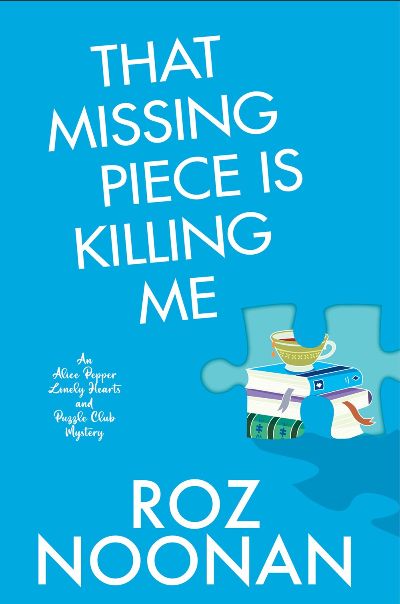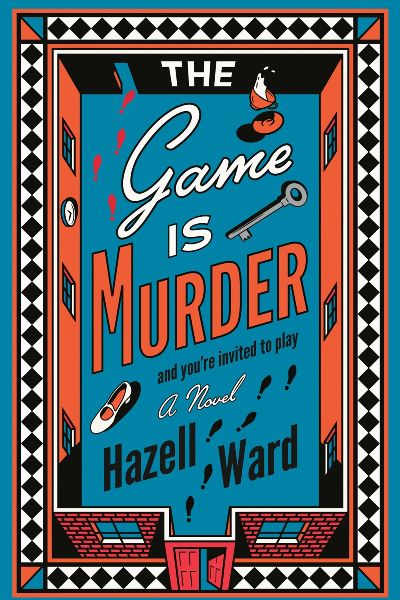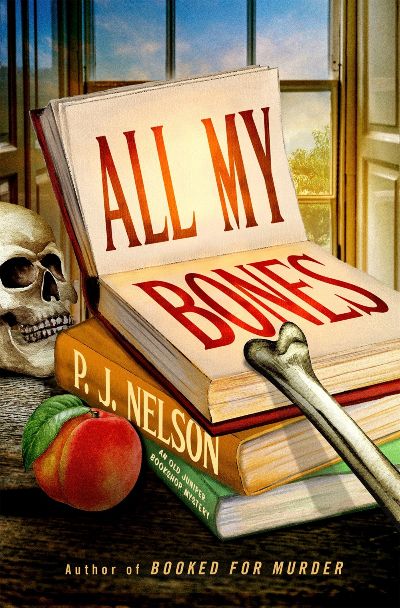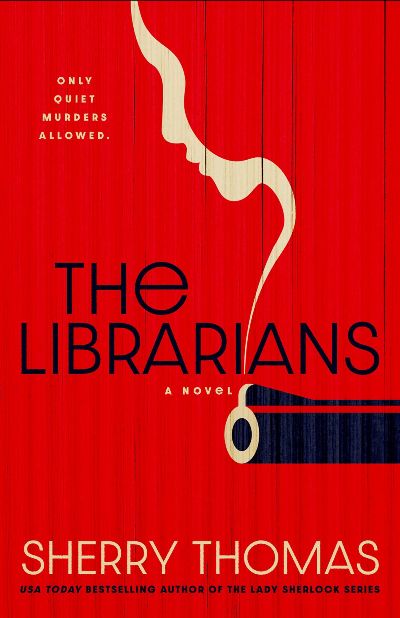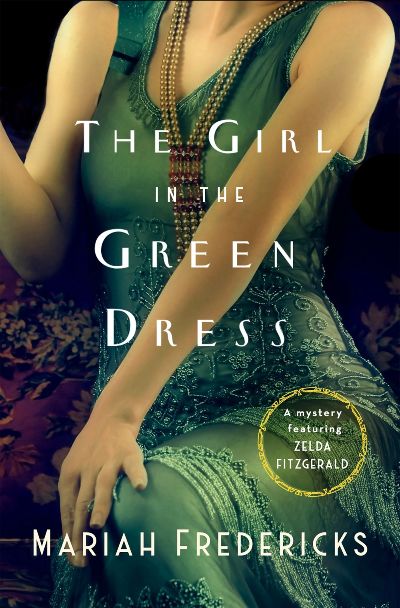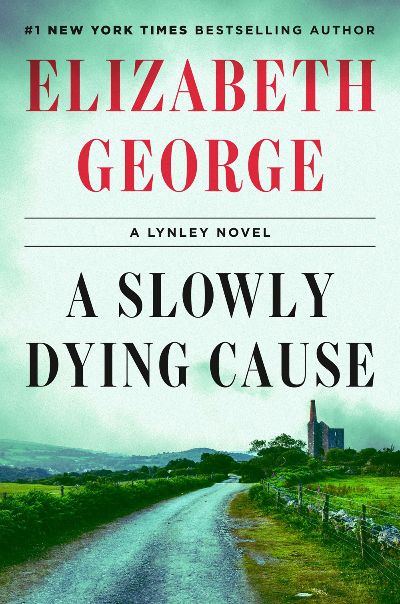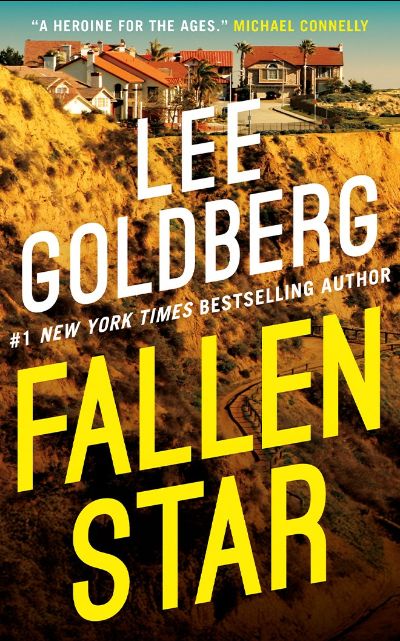Alice Pepper has one busy life. She’s director of the West Hazel, Oregon, public library. She’s the center of a group of friends—all puzzle fanatics—who regularly meet for meals and puzzling. And she’s got plenty of family members, like her nieces, whose lives she needs to keep an eye on. She may have had to put off retirement because her divorce has wiped out much of her savings, but Alice always keeps focused on what’s important. And in much of this book it’s the disappearance of her friend Michelle Chong, martial and visual artist, that has Alice’s attention. Did Michelle run away, finally escaping from that no-good husband to create a life elsewhere, or was she a victim of domestic violence? Nearly half the book is devoted to searching for Michelle, and once that’s resolved this second book in the series (after Puzzle Me a Murder) expands deeper into Alice’s world—which is loving and caring, yes, but also features major pieces of the past she has been unable to resolve. For fans of Richard Osman, Nancy Bush, and Leslie Meier.
Review
In Ward’s clever and unusual debut, the reader is put to work solving a murder, their task propelled by a sassy narrator who insults them throughout. The tale opens with murder-mystery dinner at which guests hear the story of a nanny who’s murdered in a case of mistaken identity; when the former man of the house, Lord Verreman, discovers that he hasn’t killed his wife, Lady Verreman is able to escape. At least, that’s what police believe. At the dinner, guests are told of various anomalies at the scene and alibis and motives for others connected to the case, and are led through the inquest after the nanny’s autopsy. Then the viewpoint switches: a detective is hired by the rich couple’s son and is required to visit the the home where the murder happened, hear the evidence—in a most unusual delivery—and reveal the culprit. These first two sections are unusual enough, but the third tops them: the reader is presented with all the evidence and must make choices step by step as to what they believe, in the end reaching a verdict of their own (a contract is in place, after all). What an intriguing start for this author!
Bryden seems to have the perfect family. She has a loving husband, Sam, and an adorable three-year-old daughter named Clara. One night when he’s working late, Sam gets a call from Clara’s daycare. Bryden has not picked up their daughter and is not answering her phone or responding to texts. Sam picks Clara up and arrives home to find Bryden’s cell phone and purse in the apartment and her car parked in the garage. Where did she go, and what happened to her? Detective Jayne Salter of the Albany Police Department gets the case. From the moment she starts investigating, she finds Bryden’s family, friends, and neighbors all seem to be hiding something. But does that make one of them guilty? Lapena keeps the suspense and mystery going to the final page. Readers, at one point, will think everyone is responsible for Bryden’s disappearance, but the truth is shocking and surprising. Jayne will uncover more murder and chaos than she’s bargaining for, and Lapena could have a series character on her hands with this charismatic detective.
Hang on to your hat! This latest from Andrea Mara is one twisty terror ride that will have readers glued to the page. The premise starts out simple enough. Susan O’Donnell, a high-school math teacher, is a new mother, her daughter Bella having been born four months ago. Safe to say Susan is exhausted, sleep deprived, and anxious. So when she reads a snide WhatsApp message from the local neighborhood queen, clearly directed at Susan, she sends it on to her two sisters with her own remarks: “omg she’s such a smug wagon. I’d love to send her the pics of her husband wrapped around the PR girl at the opening party for Bar Four…” Bitchy? Totally. Funny? Yes, indeed. Except that Susan makes a dreadful mistake: she sends her post to not just her sisters, but to the 300 residents of her housing estate. Time to grovel and beg for forgiveness. Except things don’t work out quite that way. Instead, this one incident sets in motion a series of lies, violence, and murder that no one can stop. A knock-out.
On this second visit to The Old Juniper Bookshop in Enigma, Georgia, on a Sunday morning in April, shop owner Madeline and friend Gloria, an Episcopal priest, act on the notion to prep the bleak front lawn of the shop for planting roses. Unfortunately, they uncover the body of the town’s most difficult and wealthy citizen instead. Circumstances make Gloria the prime suspect and, of course, Madeline must save her friend. There is the influence of money, old family disputes, and a wonderful wealth of small-town gossip that also fuels the situation, a not-actually-haunted haunted opera house, not-for-sale rare books that actually are, and a very erudite gardener/poet. Maddie and her cohort work against the wisdom that says to leave things alone and of course solve the crime. In the end there is justice, and a bit of romance. Perhaps even the rosebushes will get planted. Will we make it back to Enigma, maybe in the Fall? I wouldn’t be surprised.
This second novel in the “Sounds Like a Plan” series provides the same high-energy, pedal-to-the-metal narrative as the first book, while keeping the romance between our two detectives very much alive and humor very much in evidence. Jackson Jones and Mackenzie “Mac” Cunningham have barely set up their PI practice—most of their office is still in boxes—when they are summoned by three of Los Angeles’s leading gangsters. Seems like these mobsters have an urgent matter on their hands, and even though they are big-time rivals, they have come together to command Jackson and Mac to take up the case. Specifically, they want them to locate a missing person who is likely close to death. What has the gangsters so worried? The fact that this missing person has been gathering dirt on the three of them for decades, and it will all become public information once he dies. As much as Jackson and Mac would like to say a big No! to this career opportunity, they aren’t given that choice. With the clock ticking, these two detectives—who can’t even agree on how to decorate their office—reluctantly head out into LA’s ritziest neighborhoods with the LAPD right behind them. Fierce and fiery dialogue between the detectives helps to make this a winning series that offers crime fiction readers and adventurous romance readers much to enjoy.
I possess real expertise in only a few areas. Just two, in fact. One is crime fiction, and the other is public libraries and what makes them work. So naturally I was pretty elated to come across The Librarians, and I’m happy to report that Sherry Thomas portrays libraries and librarians as accurately as I have ever come across in a book. Set in a modest branch library in the suburbs of Austin, Texas, the novel dwells on four quirky staff members, each of whom has found both a sense of purpose and a home in the library, as well as strong friendships. But after the library’s new game night, two library users are found dead. And remarkably, these deaths trigger stories from each of the librarians, with each one finding their lives turned upside down. Thomas is a much-lauded author of historical romance, and this book shares in the eloquent writing she is known for. Perfect for a book-group discussion.
As in her earlier novels (The Lindbergh Nanny, The Wharton Plot), Fredericks brings history to life through the eyes of a lesser mortal who is thrust into the world of the rich—and in this case, the notorious—and as in her previous works, succeeds brilliantly. Morris Markey is a New York Daily News journalist in the roaring twenties when he sees Joseph Elwell, a neighbor on the swanky side of their Manhattan street, escorted home by the mysterious woman of the book’s title, her dress resembling confetti made from money. He thinks little of it—the rich will be the rich, after all—until the next morning, when Elwell is found dead. Markey seeks help from a couple who know everyone and can get in anywhere: Scott and Zelda Fitzgerald, whose glamorous yet sad life is examined in emotional detail by Fredericks. Scott gets less limelight here than Zelda, whose desperation to be fascinating takes center stage and will engross readers. Authenticity shines from the page as the author provides tidbits from period journalism and other sources and recreates the forced frippery of the Fitzgeralds’ sometimes-mean bon mots. A real world is carefully created around the question of who the girl in the green dress is, whether she killed Elwell, and how far into the Fitzgeralds’ glitzy world a working man dares go. For a great pairing, try this alongside Avery Cunningham’s The Mayor of Maxwell Street.
Characters of all sorts and types, many unpleasant at best, fill the pages of this, the 22nd Inspector Lynley novel. There is a complicated scheme to buy the land or mineral rights in an area of Cornwall to mine lithium. The sleazy agent of the mining company finds the murdered body of Michael Lobb, tin craftsman and major holdout to the plan, and thus begins the search…for the weapon, for the motive, for the truth of the matter that forms the rest of the skillfully built puzzle that makes up the book. Bea Hannaford is in charge of the case (old friend Lynley doesn’t show up until much later) and focuses on Kayla, the the very much younger wife of Michael; his ex-wife; and his grown children as suspects. The story is eerily filled in by Michael himself in chapters interspersed with those on on the investigation. Even though all the alleys, many blind, are followed, it is the tiny pieces and astonishing happenstance that bring everything to a factual, reasonable end, with Lindley of course providing wisdom. After all this time, it’s gratifying to see how the author can take this tangled skein of a story and piece it out to a smooth conclusion.
Los Angeles Detective Eve Ronin uses an unorthodox method to stop a robbery while off duty, putting her in the boss’s crosshairs in Goldberg’s (Dream Town, Calico, Malibu Burning, Ashes Never Lie) latest. Eve is torn between her celebrity status from having a TV show based on her “life” and the higher-ups who want her to leave. Even a suspension is temporary when videos of Eve stopping the robbery go viral and a dead body is discovered in a metal drum. Her life and the case escalate when one of the suspects has a vendetta against her. Add corruption inside her own department and a helicopter crash that hits literally too close to home, and she barely has time to breathe. Eve must balance her pursuit of justice and be on her best behavior since one false move could mean the end of her career, even if she’s the most famous detective in Los Angeles. Readers will love Goldberg’s dive into Eve’s world and the quirky aspects of Los Angeles life as well as the continuing story (Goldberg even throws in an extensive cameo featuring featuring his other series characters). Whether Fallen Star is your first time reading Eve or your sixth doesn’t matter. In either case, Goldberg has done it again with a compelling and complex mystery.

